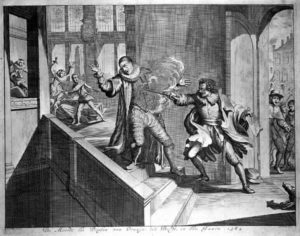
1584 The assassination of William the Silent
By 1555 Europe had suffered two generations of religious upheaval. The Holy Roman Emperor Charles V had had enough; he had battled Islam in the Mediterranean and Protestantism in Germany, Spain, and the Low Countries but now he was retiring. The German lands he gave to his brother Ferdinand and to his son Philip he bequeathed the Spanish possessions, which included the Netherlands. Ferdinand brought an end to the religious wars in Germany and Austria by the Peace of Augsburg which tolerated the presence of both Catholic and Protestant areas, but Philip was made of sterner stuff. Declaring that he would not be a king over heretics, he resolved to snuff out the reformed religion in all the lands he ruled. This would involve him in religious conflicts in England, France and the Netherlands.
Philip was ruler over the Dutch provinces but the locals enjoyed many traditional liberties and many of them felt that these freedoms should extend to the adoption of Protestantism. An anti-Spanish party grew in the Netherlands, opposed to the introduction of the Spanish Inquisition and the presence of Spanish troops. One of its leaders was William of Orange, known to history as the Silent. Political opposition grew into open rebellion and for decades Protestant forces battled the Spanish. In 1580 William was declared an outlaw by King Philip and a price placed on his head. The proclamation read:
And to the end indeed, that this matter may be the more effectually and readily performed, and so by that means our said people the sooner delivered, from this tyranny and oppression, we willing to reward virtue, and to punish vice, do promise in the word of a king, and as the minister of God, that if there be any found, either among our own subjects, or amongst strangers, so noble of courage, and desirous of our service, and the public good, that knoweth any means how to execute our said Decree, and to set us and himself free, from the aforesaid plague, delivering him unto us quick or dead, or at the least taking his life from him, we will cause, to be given and provided, for him and his heirs, in good land or ready money, choose him whether, immediately after the thing shall be accomplished, the sum of 25 thousand crowns of gold, and if he have committed any offence or fault, how great and grievous soever it be, we promise to pardon him the same, and from henceforth do pardon it, yea and if he were not before noble, we do make him noble, for his courage and valiant act: and if the principal doer, take with him for his aid, in the accomplishment of this enterprise, or execution of this his fact, other persons beside himself, we will bestow upon them benefits and a reward, and will give every one of them, according to their degree, and according to that service which they shall yield unto us in this behalf: pardoning them also whatsoever they have ill done, and making them likewise noble.
These generous inducements to murder proved effective. In March 1582 a French teen-ager named Jean Jaureguay fired at William from point-blank range but his gun was overloaded with powder and it blew off the would-be killer’s thumb instead. He was cut down instantly by William’s guards. In July 1584 an assassin succeeded in taking William’s life. Balthasar Gerard, a Burgundian Catholic, infiltrated the court of the prince and shot him dead, the first murder of a head of state by a firearm in history. William’s last words were “Mon Dieu, ayez pitié de mon âme; mon Dieu, ayez pitié de ce pauvre peuple.” (My God, have pity on my soul; my God, have pity on this poor people). Gerard was found guilty and hideously tortured.
In commissioning the killing of his opponents Philip created a fashion for targeted assassination. Many English Catholic attempts would be made on the life of Elizabeth I and the Gunpowder Plotters of 1605 attempted to wipe out the whole English ruling class. In France, Henry III sanctioned the murder of his Catholic foe Henry of Guise in 1588 and in the next year was himself murdered. His successor Henry IV was assassinated in 1610.